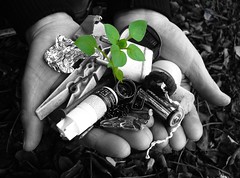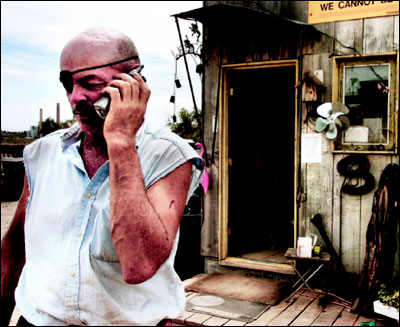 I bought a pack of gum a few months ago. I paid with a credit card. I signed my paper receipt, was handed my duplicate paper copy of the transaction, expressed my gratitude for the exchange and walked outside. I unwrapped the plastic packaging surrounding the paper box containing the aforementioned gum. I opened the lid, unwrapped the tin foil around the packets of individually wrapped goodness. Then I carefully selected my piece, unwrapped it and set to chewing. As I chewed, I looked at the green gum package blankly when something caught my eye. In between the main paper packaging, the secondary foil packaging, and the shelves that held the remaining individually wrapped pieces, there was a small picture. It was a picture of a stick figure throwing the accumulated ball of waste into a garbage pail, with words underneath that read “Do your Part.”
I bought a pack of gum a few months ago. I paid with a credit card. I signed my paper receipt, was handed my duplicate paper copy of the transaction, expressed my gratitude for the exchange and walked outside. I unwrapped the plastic packaging surrounding the paper box containing the aforementioned gum. I opened the lid, unwrapped the tin foil around the packets of individually wrapped goodness. Then I carefully selected my piece, unwrapped it and set to chewing. As I chewed, I looked at the green gum package blankly when something caught my eye. In between the main paper packaging, the secondary foil packaging, and the shelves that held the remaining individually wrapped pieces, there was a small picture. It was a picture of a stick figure throwing the accumulated ball of waste into a garbage pail, with words underneath that read “Do your Part.”
“Do my part”, I repeated. I chomped my gum a few more times, chewing on my orders. It seemed simple enough. I am not great with directions, but I felt that I could handle that. The picture made it look easy. I was just to throw away the ball of accumulated spent packaging, which was made up of trees that took years to grow, plastics derived from petroleum, and aluminum extracted with great effort all with the sole purpose of being wrapped around something destined to be unwrapped, thrown away, and reburied in a hole or better yet, burned to make room for more people to “do their part.”
Something wasn’t sitting right, but I couldn’t put my finger on it. I found myself confused, which is nothing new for me, but this time it was different. I started thinking, “so, what then, is my part?” It was a question of particular relevance, as, by good fortune, I found myself without a job last October and this question of “my part” and the future occupied a good portion of the space between my ears.
In the weeks that followed, I tossed around business ideas with a friend. We discussed at great length the world of waste and recycling. In the previous year, I had written a business plan dedicated to organics recycling and vermicomposting, so it was a world that I had a keen interest in exploring further. My friend expressed his general distaste for the waste business, desiring instead to look at alternative energy. The world of alternative energy seemed fascinating, I agreed, but over served by folks much more talented, intelligent, and creative. I insisted on exploring opportunities in waste and recycling. He rattled off a lengthy list of discouraging facts, asking finally why anyone in their right mind would go into that field. To which I responded, “Exactly!”
To elaborate on this point, I took him downstairs to my vermicomposting bin in the basement. I opened up the lid to the first tray, where my red worms were happily devouring my used food scraps and I asked him a simple question, “How many people in your class growing up when asked to name their favorite animal, responded, ‘worms’.” He answered, “none”, with a look that implied “you are a jackass.” No arguments here, but that was beside the point.
“Of course not,” I continued, “they are not sexy, much like, the ‘waste’ business. However, these worms provide one of the most essential functions in all of nature; they take ‘waste’, digest it, and transform it into valuable nutrients to continue natures’ beautiful and proven closed loop cycle.”
The point of the trip to the red worm bin was to illustrate the fact that we could provide a similar service for industry. We could become a part of the movement to help redesign industry and move it away from the inefficient legacies of the first industrial revolution, towards a process that gradually eliminates the whole concept of “waste”. In the process, maybe we could redefine “our part.” Perhaps “our part” was to acknowledge that waste was the sign of an inefficient system in need of change and that the orders on the gum wrapper, though strangely convincing, were completely wrong. Maybe then “our part” should turn towards cultivating industries’ discarded items, digesting them in our own right, into a form that nourishes other industrial and agricultural processes.
Thus, the evolution of Waste Farmers, a company that we hope will grow to fill the large, albeit idealistic, shoes inspired by gum wrappers, nature’s design, William McDonough, the Lovins’, Eric Lombardi, and other forefathers of the sustainability and recycling movement, and the belief there is no dream too outrageous to achieve.
Thank you for listening to this ramble. I just wanted to share some thoughts with the IE family as I am inspired each day by your posts, comments, and actions.
*FataNera*’s via Flickr’s Media Commons


